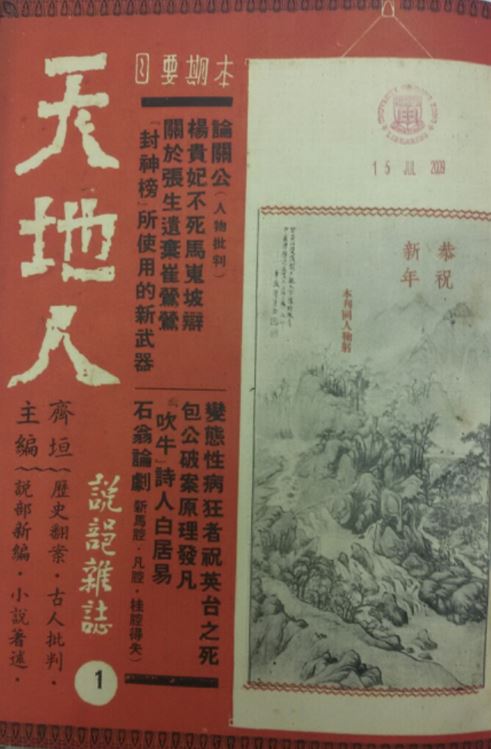 Annotation
Annotation

Tien-D Men Magazine was yet another ‘Cantonese School’ periodical. Launched as a bi-weekly, it became first a monthly and then, after Issue 19, appeared every 10 days. Subtitled ‘shuobu (“story-telling”) magazine’, its aim was ‘to reverse verdicts (fan an) of history; to put historical figures on trial; to rewrite historical stories; to create xiaoshuo (narrative fiction)’. An editorial titled ‘Notes on the debut issue’ further underlined its aspiration to ‘revisit history and mould new narratives’, so that ‘flaws of ancient people’ could be identified.
The editorial also acknowledged that the magazine had been launched in a ‘not most presentable’ form, but since it was willing to engage indiscriminately in dialogues with ‘topics of all kinds’, ‘from heaven to earth, and of the people in between’, so it had been named Tien Di Ren (‘heaven, earth, people’).
Among its articles was a column on revisiting history which discussed whether Wu Sangui, a notorious military figure from the Ming dynasty, was a traitor, a column on old tales retold which reinterpreted the death of Zhu Yingtai in ‘The Butterfly Lovers’ legend, and a column about a new version of Pu Songling’s Strange tales from a Chinese studio.
Througout all issues, Hong Kong had a persistent presence. From fiction that used the city as a background in a column titled ‘Metropolitan Close-ups’ to essays on fengshui, its geography and colloquial language. Especially noteworthy is a column titled ‘Symposium of Everything and Anything, Related, or Unrelated’. Written in Cantonese and featuring characters with names such as Aunt Three, Husband of Aunt Three and Mrs. Chiu who impersonated people’s speech and sentiments, it offered a satirical commentary on social issues in a way that made it a forerunner of the famous long-running radio programme ‘Eighteenth Floor Block C’.
Two details that await confirmation are whether its editor, Qi Yuan, was the popular fiction writer Sun Shuxian who also adopted Qi Yuan as a pen name, and whether two people listed as contributors, Xia Wuji and Wuji, are perhaps connected with Xiahou Wuiji, another of Sun’s pen names.




